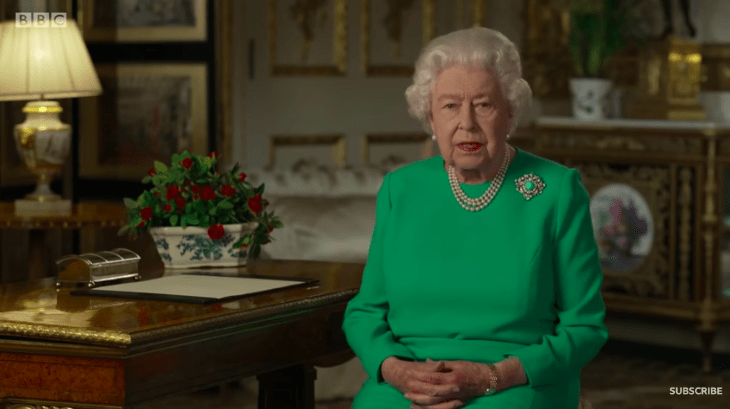One happy result of the horrible virus is that it has prompted the Queen to give us not one but two statements of her faith in this country and in God. Together they demonstrate vividly the exquisite, strong but light touch of our almost timeless monarch.
In her four-minute broadcast on the virus on Sunday 5th April, she did more than anyone else could have done to comfort and unite the country in this awful time of Covid.
And then, in her unprecedented Easter statement , she showed (as she does every Christmas) her absolute faith in the teachings of Christ. We have to celebrate Easter apart this year. ‘But Easter isn’t cancelled. Indeed, we need Easter as much as ever’. The resurrection gave Jesus’ followers ‘new hope and fresh purpose, and we can all take heart from this. We know that coronavirus will not overcome us.’
In her television broadcast from Windsor Castle a week before, the Queen had a vast audience of 24 million people – most of them sequestered at home and eager to be reassured by the most benign and apparently permanent personality in the nation’s life. Many of them were young and will have glimpsed, perhaps for the first time, the role that she has played (almost all her life) in uniting the country, especially in times of hardship, from the Darkest Hours of World War Two onwards.
Her short speech was likened by the Times to that of her father King George VI on the declaration of war in 1939, and to that of her more distant ancestor Elizabeth I as she encouraged the country to defeat the Spanish Armada in 1588. Our Elizabeth II acknowledged the unprecedented disruption and grief that the virus is causing. And she expressed her admiration of ‘the attributes of self-discipline, of quiet good-humoured resolve and of fellow-feeling still characterise this country.’ Those are also qualities she embodies herself.
Her thanks to NHS frontline staff, to all those compelled to stay at home and to those already grieving, was an extraordinary example of the way in which a monarch can transcend party politics and speak for the nation. The most poignant moment in the broadcast was when the Queen recalled her first broadcast to the children of Britain in 1940, a year after the war began. She was only 14 years old and, she said, she was helped by her sister, Princess Margaret.
‘We, as children, spoke from here at Windsor to children who had been evacuated from their homes and sent away for their own safety. Today, once again, many will feel a painful sense of separation from their loved ones. But now, as then, we know deep down that it is the right thing to do.’
She was reminding us all of our duty – a word which is not as fashionable today as it was when she was a child and which she imbibed daily from her parents. Just after war was declared in September 1939, the Archbishop of Canterbury wrote to her mother, then the Queen, praising her sympathy and fortitude and said ‘I feel inclined to say to Your Majesty what was said in the bible story to Queen Esther, ‘Who knoweth whether thou art come to the Kingdom for such a time as this”.
In her reply, the Queen wrote: ‘I know, as do all our people, that we are fighting evil things, and that we must face the future bravely. I will try with all my heart to help the people, if only one could do more for them – they are so wonderful….’
She and the King worked ceaselessly to sustain morale during the war. On 13 September 1940, they were both nearly killed when Buckingham Palace itself was bombed. Only an hour or two later that same day they visited a badly-bombed area of the East End and the Queen wrote to her mother-in-law Queen Mary ‘I really felt as if I was walking in a dead city’. They saw a school which had been hit ‘and collapsed on the top of 500 people waiting to be evacuated – about 200 of them are still under the rubble. It does affect me seeing this terrible and senseless destruction. I think that really I mind it so much more than being bombed myself. The people are marvellous and full of fight. One could not imagine that life could become so terrible. We must win in the end.’
Similarly, after a visit to Plymouth between two massive bombing raids in March 1941, she wrote ‘the foul Germans made a very heavy attack on the town and dockyard. What brutesthey are – I am certain they first go for the working class houses, hoping to break the spirit of our people.’
She wrote that ‘One of the hard things about being King and Queen of a country that one loves so much [is that] every time this sort of murderous attack is made, we feel it, as if our own children were being hurt. All we can do, is to do our very best, and leave the rest in God’s hand.’
This love of Britain and love of God have been inherited and displayed by her daughter, our Queen, ever since. On her 21st birthday in 1947 she promised that ‘my whole life, whether it be long or short, shall be devoted to your service’. And so it has been.
In 2022, the Queen will be celebrating her Platinum Jubilee, an astonishing moment for celebration. Her constancy and her personal commitment to faith, hope and charity through decades of tumultuous social change have given this country a stability it could never otherwise have enjoyed.
In her deeply personal Easter message , she reminded us that ‘As dark as death can be – particularly for those suffering with grief – light and life are greater. May the living flame of the Easter hope be a steady guide as we face the future.’
Mindful, as she always is, that there are many religions in Britain today, she concluded, ‘I wish everyone of all faiths and denominations a blessed Easter.’ James Jones, the former Bishop of Liverpool, points out that her faith gives her both a spiritual authority and a humility ‘which flows from the vows she made before God at her Coronation. In the endless discussions about British identity, she defines that identity best by embodying a unique blend of tradition, stoicism, wit, pragmatism and principle.’
That unique blend touches almost everyone. Even Alastair Campbell, Tony Blair’s former aide and a lifelong republican, wrote after her broadcast that she is ‘one of the most remarkable people on the planet’. The constitutional historian Vernon Bogdanor has pointed out that in an age when politics can choke almost everything in its unnatural embrace, it is ‘of inestimable value’ that the Queen, the symbol of the state ‘should remain uncontaminated by political controversy.’ Since 1952 ‘it has been the Queen who has been able to interpret the nation to itself.’ No one else could have done that. Indeed, one is tempted to say that, like her mother and Queen Esther, ‘thou art come to the Kingdom for such a time as this.’
It is also clear from the remarkable public service that the Prince of Wales has given for decades and which Prince William is now emulating, along with his wife, the Duchess of Cambridge, that they too have inherited much of the same sense of duty that infused their parents and grandparents – and, in William’s case, great–grandparents. Both Princes have offered their own messages of support and encouragement in this time of Covid.
The hereditary principle is much mocked today. It is certainly a lottery. But this country has been an incredibly fortunate winner in that game of chance since Queen Victoria came to the throne in 1837, almost 200 years ago. Our monarchy has been a crucial component of the system of government that protected us, unlike almost all of our neighbours, from despotism in the last two centuries. Not for nothing did Roger Scruton describe it as ‘the light above politics’ which magically represents the spirit of England and shines upon the dead and the unborn as well as us today.
On each of the last two Sundays, the Queen showed with her wonderful lightness of touch that our constitutional monarchy nourishes and protects our democratic institutions. As she concluded, in facing down the challenge of the virus ‘We will succeed – and that success will belong to everyone of us.’
William Shawcross is author of ‘Queen Elizabeth, The Queen Mother, The Official Biography.’<//>
Got something to add? Join the discussion and comment below.
Get 10 issues for just $10
Subscribe to The Spectator Australia today for the next 10 magazine issues, plus full online access, for just $10.




















Comments
Don't miss out
Join the conversation with other Spectator Australia readers. Subscribe to leave a comment.
SUBSCRIBEAlready a subscriber? Log in